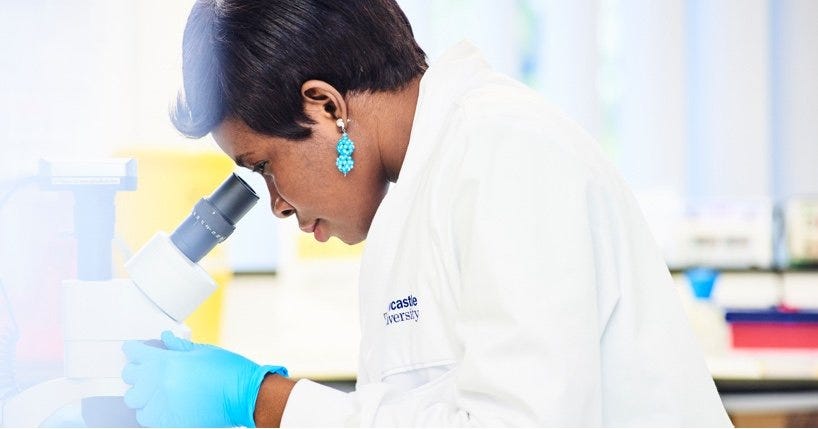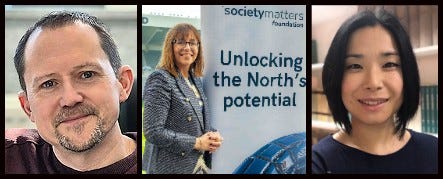The telling story behind letter on the wall
Somewhere in France, a man is making breakfast for his wife because scientists in Newcastle refuse to accept that innovation only happens in the Golden Triangle
Alison Dunn is a busy lady. The former solicitor is chair of the Voluntary Organisations’ Network North East (VONNE), a social justice activist, and CEO of the Society Matters Group, which includes Citizens Advice Gateshead. She is also host of the podcast series This Is The North.
She recently talked to Mike Waring, Professor of Medicinal Chemistry at Newcastle University and his colleague Akane Kawamura, Professor of Chemical Biology, for a conversation that opened her eyes to where innovation actually happens—and who benefits when it does.
“I have a letter on my office wall that I look at every day,” Professor Mike Waring told me. “It's from a man in France who wrote to tell me his story.”
The man had been diagnosed with lung cancer and told there was no treatment. His concern wasn't for himself—it was for his disabled wife. He couldn't go through traditional chemotherapy because he'd be too ill to care for her.
Then came the phone call that changed everything. A doctor had spotted a genetic marker that made him eligible for an experimental drug—one that had started as chemical equations scribbled on Newcastle whiteboards by Mike's team.
”Now he takes a once-daily pill,” Mike says. “And he's alive and healthy enough to look after the person he loves most.”
That story stuck with me long after our conversation ended. It's exactly why the debate about where innovation happens isn't academic—it's about real people's lives and the impacts it has.
The success story we don't hear about
What really struck me about talking with Mike and Akane wasn't just their scientific credentials—it was discovering that Newcastle University has successfully brought two cancer medicines to market. Two. That's remarkable in a field where most researchers work entire careers without seeing a single drug reach patients.
They've achieved this with relatively modest funding, mostly from Cancer Research UK. It proves that Northern institutions can compete globally when given the chance.
But then Akane said something that made my heart sink: “Job opportunities are limited in the North East in terms of people who have degrees and postgraduate degrees. They feel that they have to go down south in order to continue their careers.”
How many times have we heard that reality? Talent is everywhere, as those of us who live here can attest, but sadly, in many cases, opportunities are not. Here we have world-class science saving lives globally, and we're still losing our brightest minds because we haven't invested in keeping them here.
A vision that actually makes sense
Mike and Akane aren't just lamenting the situation—they've got a proper plan. Their vision for a North East Institute for Molecular Medicine, co-authored with Purpose Made, would create a regional hub employing potentially 1,000 high-skilled researchers, rivalling London's Francis Crick Institute.
The infrastructure already exists: world-class universities across the region, two globally ranked hospitals serving patients from Lancaster to North Yorkshire, strong pharmaceutical manufacturing heritage. The vision extends beyond Newcastle, with partnerships spanning Northumbria, Durham, Sunderland, York, and Leeds universities—drawing on complementary strengths in translational research across the North.
As Mike put it: “We thought that if we could apply some of those technologies and bring new ones in, we could have a centre that could holistically do some of that work.”
What we lack isn't capability—it's investment that matches our potential.

The barriers that need calling out
Our conversation revealed uncomfortable truths about the obstacles they face. Mike was frank about how anti-immigration rhetoric doesn't just harm international students—it undermines our ability to compete for the global talent that drives innovation.
“Our recruitment used to come from Europe. This is just a fact,” he said. “And that's something that really needs to be addressed.”
When funding bodies still assume that serious science happens in Cambridge, London, and Oxford—the so-called Golden Triangle—and not in places like Newcastle, we're fighting prejudice as much as competing for resources.
The fact is, 46% of public investment in research goes to the Golden Triangle. To see real innovation, we must fund research on the basis of excellence, not postcode, ensuring we compete with the very best in the world.
As Mike puts it: “The UK needs to continuously innovate to stay competitive. We can't compete on scale. We have to compete on innovation and therefore having institutes like the one we're proposing are critical to the UK's continued growth and success."
Why this matters beyond the lab
The economic case is compelling. The pharmaceutical sector exports £25 billion annually—Britain's third-largest trade contributor. The broader life sciences sector contributes £56 billion to GDP and supports nearly 500,000 jobs nationwide.
But there's a skills gap threatening this potential: an estimated need for 10,000 additional trained scientists. The North East could fill that gap—if we match regional capability with national investment.
As Mike explained: “If you get a successful drug, you can recall all of your costs.” Government investment unlocks private capital at remarkable ratios—£1 public funding can generate £7-9 in private investment.
The human cost of lost opportunities
What keeps coming back to me is that letter on Mike's wall, but also the students and people I regularly meet who feel they have no choice but to leave. Behind every policy discussion about regional investment, every debate about ‘levelling up’, every discussion about devolution and local growth, are real people whose lives hang in the balance.
The man in France who can care for his wife. The postgraduate student choosing between staying home and advancing their career. The families who could benefit from high-skilled, well-paid jobs in their own communities.
When Akane talked about being “passionate about developing new medicines” and how “small molecules can actually have a huge impact on our health,” I heard something that defines the North: people who do vital work not for recognition, but because it matters.
What needs to happen
Mike and Akane have shown what's possible when excellence meets opportunity. Their institute, backed by a genuine regional partnership spanning universities from Durham to Leeds, could transform not just the North, but Britain's competitive advantage in life sciences.
This is exactly what Praful Nargund meant when he talked about the disconnect between economic growth and people's lived experiences—between "skills and bills." This kind of innovative, regionally-led investment addresses both challenges simultaneously: creating high-skilled opportunities that actually pay enough to tackle the cost-of-living crisis whilst building meaningful careers that change lives and futures.
But it will only happen if we stop treating regional investment as political charity and start recognising it as national necessity. When professors can save lives from Newcastle labs, when we have the talent, vision and foundations to execute, why not do it here instead of elsewhere?
That question will determine whether the North becomes a global centre for life-saving innovation—or continues watching its brightest minds head south.
This is The North podcast is hosted by Alison Dunn and supported by Society Matters CIC.





